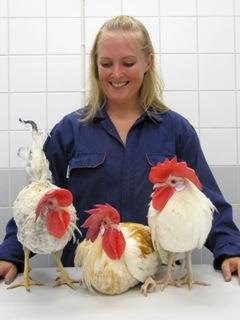TSHR - the domestication gene?

A mutation in the TSHR-gene - how does it affecct social and fear related behaviours in chickens?
Thyroid hormones are well known important to be in development and growth in birds and that signaling of thyrotropin (TSH) regulates the photo induced seasonal reproduction. A mutation at the thyroid stimulating hormone receptor (TSHR) gene in domestic breeds of chicken could be involved in the release of the photoperiodic regulation. Furthermore, TSH can affect a wide range of domestication related phenotypes, such as behaviour, growth rate and pigmentation. The aim of this study was to investigate the behaviours expressed in the different genotypes on the TSHR gene in chickens. Four standard tests were conducted, aerial predator, fear of human, social dominance and tonic immobility. An advanced intercross line of chickens between red junglefowl and White leghorn was used. Male domestic type chickens explored more, showed more less fear behaviours and showed least fear behaviours in the fear of human test. Increased activity and flight response has been interpreted as a lower fear response, which is in line with this study. The wild type chickens showed more social dominance than TSHR mutated chickens which are in line with previous results. There were no significant differences in the tonic immobility between the different genotypes. The conclusion of this study is that there is a difference between the wild type and TSHR chickens. This indicates that the TSHR gene is involved in behavioural changes during domestication.

Supervisors
Professor Per Jensen
Anna-Carin Karlsson
Responsible for this page:
Director of undergraduate studies Biology
Last updated:
05/16/12
